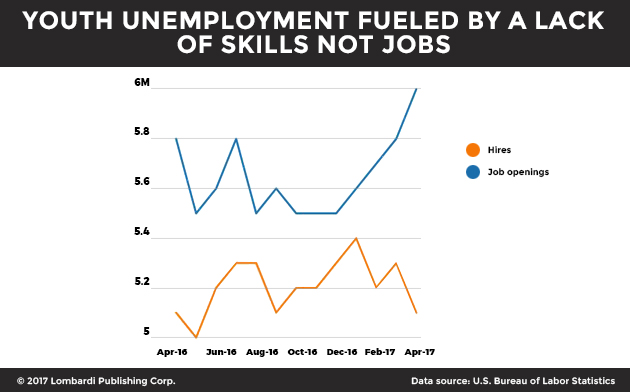Illiteracy Might Be the Biggest Enemy for U.S. Jobs
A cheap workforce hurts U.S. jobs—or at least the part of it that lacks access to a trust fund. Apart from the ethical issues, the phenomenon of underpaid work lowers the value of all jobs. It hurts society. China and other developing countries aren’t the only places where companies can outsource jobs to in order to improve profits. Technology has advanced to the point that robots taking jobs will be reality, and not science fiction.
So, U.S. jobs, or jobs in all developed countries for that matter, are under threat from sweatshops and robots. But there are two problems affecting U.S. jobs and the U.S. economy (and the current unemployment rate): Prison labor and illiteracy.
Prison labor is exactly what it sounds like. Instead of hiring regular workers at regular wages, many companies “outsource” work to prison detainees, who will perform for pennies on the dollar.
Of course, the low-cost advantage of a prison workforce has made it a widespread practice in the United States. So much so that many social and humanitarian groups have organized campaigns to boycott brands that use prison labor. It’s not just making license plates; prison laborers have been known to take hotel reservations or make furniture, like the office chair on which you’re sitting.
Maybe prisoners even made the solar panels that have earned star entrepreneurs much praise. SolarCity Corp (NASAQ:SCTY), now part of Tesla Inc (NASDAQ:TSLA), is a well-known brand worldwide. It’s synonymous with green technology, the environment, and even optimism about the future.
SolarCity’s current boss, Elon Musk, is even better known than his brands. That’s why it might shock many that his companies have been accused of relying on the work of prison inmates instead of workers who were paid above minimum wage and had the luxury of going home at the end of the day.
SolarCity also took advantage of generous incentives offered under the Business Energy Investment Tax Credit program. (Source: “The Solar Industry Needs to Let Its Federal Tax Credit Die, Says This CEO,” Greentech Media, January 13, 2015.)
Some of the requirements for incentives included job creation. And the workers who are said to have made the solar panels were, in fact, in Oregon, but in jail. SolarCity subcontracted Georgia-based Suniva Inc., which used federal inmates to assemble solar panels. (Source: “Prison labor helps U.S. solar company manufacture at home,” Reuters, June 10, 2015.)
How can anyone compete with that, when even solar panel businesses—supposedly ethical—can legally use detainee employees? It certainly helps explain why there are job cuts and why the real unemployment rate might be larger than the current statistics (about 4.3%) suggest. Still, prison and developing-country sweatshops might not be the biggest reason why so many find it difficult to find gainful employment. This reason is different in nature, because it’s unrelated to a shortage of job demand.
Inadequate Skills Hinder Current Employment Rate and Growth
The second problem affecting U.S. jobs is the shortage of basic skills that is preventing many Americans from getting called for job interviews, let alone being hired. This has been an overlooked problem, which is hurting U.S. economic growth. It’s a far greater risk for the U.S. economic outlook than anyone can imagine.

JPMorgan Chase & Co. (NYSE:JPM) CEO Jamie Dimon was clear that one of the biggest obstacles for U.S. economic growth is a pervasive illiteracy among young people. Another is poor health. So bad is the situation that many young people could not even be recruited into the military if the United States came under threat of attack. Dimon notes that about 70% of young men are unsuitable for military service. (Source: “Jamie Dimon: ‘America has to get its act together’,” CNBC, June 7, 2017.)
Based on a Pentagon study, Dimon says poor education is one of the main reasons that young men are ineligible to serve in the military. Many young people can neither read nor write. Some also suffer from diabetes and obesity. Thus, they aren’t equipped to learn basic army procedures, and they can’t perform physically on the battlefield, as it were.
The Pentagon rejects over 70% of 17–24-year-old males because they aren’t fit. It’s not just a bad heart rate that keeps you out of uniform. Inappropriate tattoos and piercings, or even excessive dependency on prescription drugs for ADHD also hinders young men from launching military careers. (Source: Ibid.)
Then there are the high school graduation rates. Depending on where you go to school, you may or may not graduate. Graduation rates are about 70% in the suburbs and a bit over 50% for the inner cities. (Source: “Large Urban-Suburban Gap Seen in Graduation Rates,” The New York Times, April 22, 2009.)
In short, such factors have seen the labor force participation rate among American men collapse. That is, fewer men (ages 25 to 54) actively seek employment or are employed today (88.4%) than in 1970 (96%). (Source: “There are more job openings than EVER right now,” CNBC, June 6, 2017.)
Putting all this into perspective, it suggests that Americans are becoming their own worst enemies. Imagine having to recruit soldiers to fight today’s modern high-tech wars, if they can’t even read or write.
It’s Like Having to Endure Successive Losses in Battle
From the military perspective, having to eliminate so many potential and voluntary recruits is the equivalent of suffering successive major defeats in battle. When you consider that so many of the reasons that account for the recruitment obstacles can be corrected through better schools—but aren’t—it’s clear there’s a problem, as the JPMorgan boss has done well to point out.
Indeed, don’t blame the Russians, ISIS, or the Chinese worker for America’s woes. Blame excess cholesterol and bad food. Together, they are doing more to stunt the prospects of American young people than those who wish the United States harm. Now, translate this problem to the civilian public and to the private sector.
To reiterate, the U.S., the land of opportunity, would love to give young people an opportunity, but few are physically or mentally able to even accept such a thing. The job market beyond the military has to choose from many unfit and uneducated folks, as it were. They do not have a high school diploma. They suffer from chronic health problems ranging from lack of concentration, to hyperactivity, to poor “aesthetics.” Even the chosen ones happen to be unable to pass the admission tests.
Thus, there is a suspicion that the U.S. labor market might be able to absorb many more workers. Not just in the super-skilled sectors, where Americans compete with the foreign graduates from the best universities for Silicon Valley or Wall Street positions. Soon, even the so called “McJobs” might require the kind of literacy that too many lack.
Both the U.S. economy and security depend on a steady pool of able-bodied and at least basically educated youth. But, it seems that such raw material is quickly becoming scarce. It’s a scarcity that America cannot afford. Indeed, people who are not qualified to even apply for the simplest jobs quickly fall behind, becoming a mere addition to the statistics of the unemployed looking for work. Then they end up losing hope and stop even looking for work, falling off the statistics. This sometimes makes the unemployment rate look better than it actually is.
Meanwhile, despite the optimism over jobs, unemployment claims in the United States have increased, signaling a worsening of the labor market. That is, more people have asked for unemployment benefits in recent months. At the end of last May, such claims rose by 13,000 units to reach 248,000, whereas analysts’ expectations were for a marginal increase to 235,000. (Source: “Weekly Unemployment Claims: Up 13K from Last Week, Worse Than Forecast,” Advisor Perspectives, June 1, 2017, last accessed June 7, 2017.)
The U.S. Jobs Apocalypse Is Coming
But this is nothing compared to what’s coming. It’s going to be nothing short of a labor apocalypse, as the retail sector continues its painful road to oblivion. Consider that one in 10 U.S. jobs are in retail. That means a potential 10% rise in the unemployment rate from the current figure. Can the U.S. withstand such an increase in benefits when Trump plans to reduce taxes across the board?
The trend is clear. Amazon.com, Inc. (NASDAQ:AMZN) is overtaking Wal-Mart Stores Inc (NYSE:WMT) as the top retailer in the United States—and possibly the world. This suggests that online shopping is overtaking the traditional retail brick-and-mortar shop. Online commerce has made major inroads, even in the clothing sector. This is an important win, because clothing often requires physical trying-on.
But retailers are offering to send products that can be tried at home and easily returned or exchanged. Also, online shopping is better suited for the compulsive and impulsive habits of modern consumers, who want to shop whenever they want, rather than within the boundaries of the traditional business day.
Not surprisingly, in the coming months, retail sector analysts expect that over 3,500 physical shops will be closed. Such names as J C Penney Company Inc (NYSE:JCP), Macy’s Inc (NYSE:M), Sears Holdings Corp (NASDAQ:SHLD), and Kmart Corporation will be affected by these closures, along with chains such as Crocs, Inc. (NASDAQ:CROX), BCBG Max Azria Group, LLC, Abercrombie & Fitch Co. (NYSE:ANF), and Guess?, Inc. (NYSE:GES). (Source: “New report: Sears and Kmart are closing 72 additional stores,” Clark, June 6, 2017.)
The Christmas 2015 and 2016 sales were disappointing at best, and the writing, as they say, was on the wall. Malls have been empty. In a situation like this, CEOs trained at the best business schools will have little choice but to act as they have been trained to do. They will either make radical changes, moving the shop doors to a computer near you, or close down altogether, hoping to catch a break on the value of the real estate assets.
The number of visitors to the malls has dropped more and more. Consumers’ habits are changing. Many jobs will be lost. But few of those losing their jobs will have the qualifications to even fight for their country. This will cause major stress on the system, and the U.S. economy will suffer.






